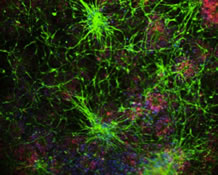Columbia University
Irving Medical Center
Neurological Institute
710 West 168th Street, 3rd floor
(212) 305-1818
Featured Research
In the Lab:
Catherine L. Clelland, MS, PhD
 Catherine L. Clelland, MS, PhD
Catherine L. Clelland, MS, PhDMy program of research is based upon the hypothesis that biological disturbances in the periphery of patients with neuropsychiatric illnesses reflect the central nervous system (CNS), and can thus provide a valuable source to identify primary pathological changes that contribute to the etiology of, and susceptibility to disorders including schizophrenia, bipolar disorder, and Alzheimer's disease. Through funding from the National Institute of Mental Health, and collaborative funding from the Stanley Medical Research Institute, my research focuses on investigating the molecular genetic pathways leading to these peripheral abnormalities; aiming to understand susceptibility, symptom presentation, and illness progression, as well as to identify novel targets for treatment. Examples to illustrate how we are translating our biological findings to test novel therapeutic approaches are described in the specific projects below.
1) Targeting Peripheral Proline in Psychiatric Illness. Proline is a precursor of the neurotransmitter glutamate, it is a neuromodulator at glutamatergic synapses, it may stimulate dopaminergic signaling, and it also has a genetic link with schizophrenia through the 22q11 PRODH gene (which encodes the enzyme that catabolizes proline). We recently found that over one quarter of an inpatient schizophrenia sample were fasting hyperprolinemic, meaning that these patients exhibited high levels of fasting plasma proline. Elevated CNS proline, which reflects that of the periphery, has been shown to detrimentally impact cognition in both hyperprolinemia type-I patients and patients with 22q11 deletion syndrome, and also in a hyperprolinemic mouse model of schizophrenia. Through funding from the NIMH (R01MH100219), and in collaboration with researchers at the Nathan Kline Institute for Psychiatric Research, my lab is now investigating 1) the molecular basis of hyperprolinemia in schizophrenia and 2) the impact of proline elevation on specific symptom domains. For example, insufficiency of vitamin D (25(OH)D) has long been considered important in schizophrenia susceptibility, and we recently observed that 25(OH)D can positively regulate PRODH expression. In schizophrenia patients (n=64) and controls (n=90) we found a strong association of 25(OH)D insufficiency with hyperprolinemia, a negative correlation between 25(OH)D and proline levels, and from causal mediation analysis, confirmed that the association between vitamin-D insufficiency and schizophrenia is mediated by hyperprolinemia (Figure 1).
 Figure 1. Hypothesized mediation model for the association between 25(OH)D insufficiency and schizophrenia. Panel A depicts the direct association between insufficiency and schizophrenia, adjusted for education level, with no mediator (path c). Panel B depicts the association mediated (in part) by the presence of hyperprolinemia (indirect paths a+b). The total effect of 25(OH)D insufficiency on schizophrenia risk, adjusted for education, is defined by the sum of the indirect plus direct paths (a + b + c′). A causal mediation analysis tested the effect size (Odds Ratio (OR) and standard error (se)) and significance of each path in a series of logistic regression models. *p = 0.05, **p = 0.005, ns= not significant.
|
Regarding symptoms, we recently showed that fasting plasma proline level interacts with a functional variant in the Catechol-O-methyltransferase (COMT) gene, which also maps to 22q11, to predict negative symptoms and negative symptom improvement in patients with schizophrenia and bipolar disorder. Specifically, from cross-sectional analysis of 95 patients with schizophrenia and 43 patients with bipolar disorder, we found that for those with one or two copies of the low-activity COMT "Met" allele, who would be predicted to have relatively high prefrontal dopamine levels, having high levels of plasma proline was associated with significantly more negative symptoms or greater symptom severity. Conversely, for patients with two copies of the high enzyme activity "Val" allele, who would have less prefrontal dopamine, high plasma proline levels were associated with significantly less severe negative symptoms, or greater improvement after approximately 1-week of treatment.
 Figure 2. Negative symptoms in schizophrenia patients treated with valproate (VPA), by COMT genotype. The boxplot illustrates that total negative symptoms, as evaluated by the Symptom Assessment for Negative Symptom (SANS), are significantly lower in VPA-treated patients with the Val/Val genotype (mean=14.6±12.67. n=15, green), as compared with grouped Met/Met (mean=30.67±17.1, n=3, red) and Val/Met (mean= 25.6±17.93, n=10, blue) genotypes (F(1,26)=4.63, p= 0.0408).
Figure 2. Negative symptoms in schizophrenia patients treated with valproate (VPA), by COMT genotype. The boxplot illustrates that total negative symptoms, as evaluated by the Symptom Assessment for Negative Symptom (SANS), are significantly lower in VPA-treated patients with the Val/Val genotype (mean=14.6±12.67. n=15, green), as compared with grouped Met/Met (mean=30.67±17.1, n=3, red) and Val/Met (mean= 25.6±17.93, n=10, blue) genotypes (F(1,26)=4.63, p= 0.0408). Negative symptoms, which include social withdrawal and emotional unresponsiveness, diminished speech and movement, and lack of motivation, often lead to the inability of the patient to keep paid employment or maintain social relationships, and as such contribute significantly to the huge personal and economic costs of severe psychiatric illness. There are no current medications that adequately address these symptoms. However, there are medications that are known to modulate proline level, such as the mood stabilizer valproate (also known as Depakote), which is a strong up-regulator of fasting plasma proline levels. In fact, we found that schizophrenia patients treated with valproate (total n=28), had significantly more negative symptoms if they had at least one copy of the COMT Met allele, versus those valproate-treated patients with the Val/Val genotype (Figure 2). That high proline has opposite effects on symptoms by COMT genotype may have implications for therapeutic decisions, because they support personalization of negative symptom treatment based upon a patient's COMT genotype, for the purpose of up- or down-regulating proline level. This may allow for specific targeting of, for example, valproate treatment to those who may benefit. Importantly, it may also allow for the potential decision not to prescribe valproate for those patients exhibiting negative symptoms who have at least one copy of the COMT Met allele.
Negative symptoms are not only found in patients with severe psychiatric illness; the full spectrum of negative symptoms can often present in patients with dementia such as Alzheimer's disease, and these symptoms are thought to arise independent of a patients' depression or their cognitive functioning. Furthermore, negative symptoms in dementia, particularly the loss of motivation, emotional indifference, and social withdrawal (collectively termed apathy), not only personally impacts the patient, but caregiver burden and distress have also been significantly associated with the presence and severity of these symptoms. We are now planning to extend our research program, in collaboration with clinicians in the Taub Institute's Alzheimer's Disease Research Center (ADRC), to explore the relationship between proline and COMT on negative symptoms in patients with dementia.
2) Targeting a Peripheral Deficit of Tetrahydrobiopterin (BH4) in Schizophrenia, Schizoaffective Disorder, and Bipolar Disorder. BH4 is a vital cofactor required for neurotransmitter synthesis, and our group reported a deficit of plasma biopterin (a measure of BH4) in psychiatric disorder patients. We have more recently found evidence for genetic association in psychiatric patients with a very interesting candidate gene (GCH1, which encodes the enzyme that catalyzes the rate-limiting step in BH4 biosynthesis), and my lab is investigating how dysregulation of GCH1 contributes to the BH4 deficit and also, in collaboration with researchers at the Nathan Kline Institute, whether some mood stabilizing drugs function via regulation of GCH1 and BH4 synthesis. Translating these exciting findings, and in collaboration with Dr. Jeffrey Lieberman, Chair of Psychiatry at CUMC and Director of New York State Psychiatric Institute, we are testing whether alleviation of the BH4 deficit via treatment with a synthetic BH4 supplement (6R-BH4), may give rise to an improvement of positive and negative symptoms, and neurocognitive deficits, in patients with schizophrenia and schizoaffective disorder.
 Current members of the Clelland Lab (from left to right): Jessica Harte, Study Coordinator; Catherine Clelland, PI; Eve Byington, Technician.
|
Catherine L. Clelland, MS, PhD
Assistant Professor of Pathology and Cell Biology (in the Taub Institute for Research on Alzheimer's Disease and the Aging Brain)
cc2786@columbia.edu
Conflict Statement: C.L. Clelland and her NKI collaborator are inventors on multiple patent applications that are based in part upon these study data. If awarded, the patents will be owned by their respective institutions, and the inventors may benefit financially in the future if these patents are licensed.

